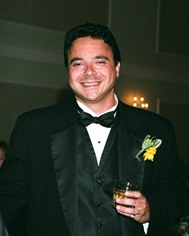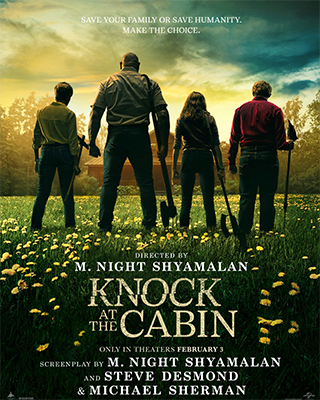M. Night Shyamalan makes one of his best movies with “Knock at the Cabin”- a taut psychological thriller where hostages try to outwit home invaders sent on a mission of mercy…or murder.
Based on Paul Tremblay’s book “The Cabin at the End of the World,” a vacationing same-sex couple Eric (Jonathan Groff) and Andrew (Ben Aldridge) along with their adopted 7-year-old daughter Wen (Kristen Cui) are visited by four strangers while staying at a secluded country cabin. In addition to being found in their wooded isolation, Eric and Andrew find it odd that all four strangers carry crudely-made weapons. Things get odder when the four claim to have been sent to stop the world from ending.
After forcing themselves inside the cabin, Leonard (Dave Bautista), the spokesperson for the four, reveals their purpose: unless Eric and Andrew choose to murder one of their own family members, Biblical plagues (i.e. earthquakes, floods) will kill everyone on Earth. Making things more unhinged, Leonard and his three cohorts profess they don’t want to be there- each received the same visions to meet (though living miles apart) and come specifically for Eric and Andrew to make their sacrificial choice.
While apologizing for their plight and news of the impending apocalypse, the four are committed to carry out their mission and plead for Eric and Andrew to make a decision. Time is of the essence. If Eric, Andrew and Wen can’t sacrifice a life among themselves, the plagues will start. To ensure their mission goes off without a hitch, Leonard’s quartet hold homemade weapons on long handles made from parts including meat cleavers, pitchfork tines and sledgehammer heads. Their weapons’ purpose is predicated on Eric and Andrew’s answer. Naturally, Eric and Andrew refuse to choose. Naturally, Leonard and his pals have tools to use.
For fans of Tremblay’s book, Shyamalan adapts it fairly faithfully. Changes are made where characters are concerned for dramatic effect and for a faster cinematic pace, and Shyamalan revises the ending for a more definitive, supernaturally-strengthened finale. However, all of Shyamalan’s reworking works: the film’s 100 minutes moves fast and its clear-cut climax answers any audience question. While both Tremblay and Shyamalan play with whether the foursome has received a calling for Armageddon or whether it’s a con job perpetrated by one of the four (the ‘twist’ that obviously attracted Shyamalan), the film keeps the book’s debate of divine intervention versus delusion intact and how both can be contagious.
Among “Knock’s” impressive attributes are Shyamalan’s direction, featuring close-ups for intimacy and a camera whirling around the cabin’s claustrophobic setting to allow the audience to see different actions happening at the same time (it’s probably the best camera work I’ve seen used in one room since Hitchcock’s “Rope”), and a good cast headed by Dave Bautista as Leonard. For Shyamalan, even when “Knock” turns violent, it’s just out of frame to keep the film’s shocks cerebral. For his role as Leonard, wearing a way-too-tight short-sleeved dress shirt to show tattooed-sleeved muscular arms, the bespectacled Bautista looks every bit the religious zealot. However, when Leonard’s empathy toward Eric and Andrew slowly reveals itself and Bautista’s tears show his tortured soul, you sympathize with Leonard’s inability to abandon the burden of a doomed savior.
“Knock” could have been a sadistic, home invasion horror movie instead of an engaging hostage drama (on par with “Desperate Hours”) just as it could have been a dull thud instead of Shyamalan’s attention-grabbing return to stylish filmmaking.

